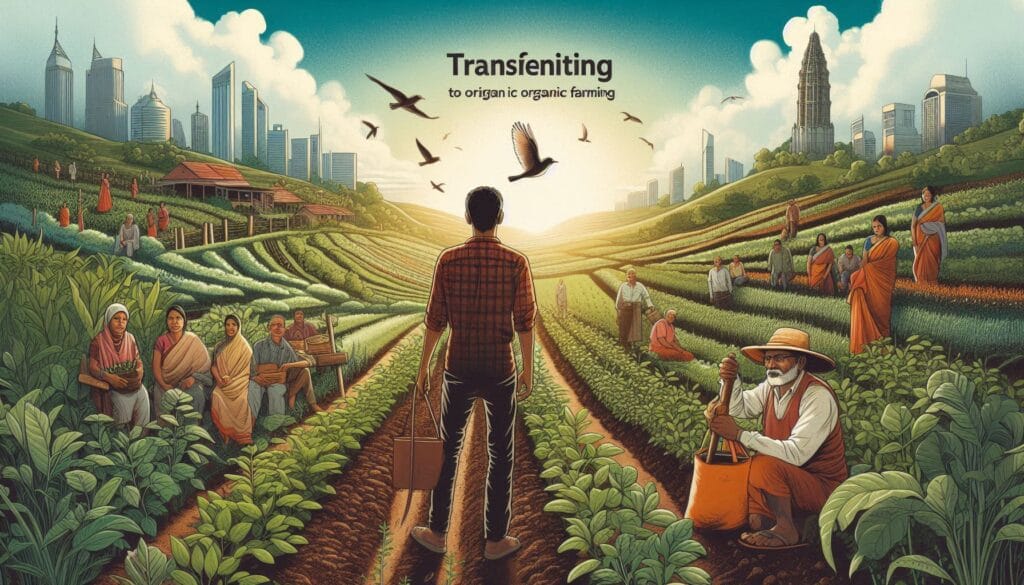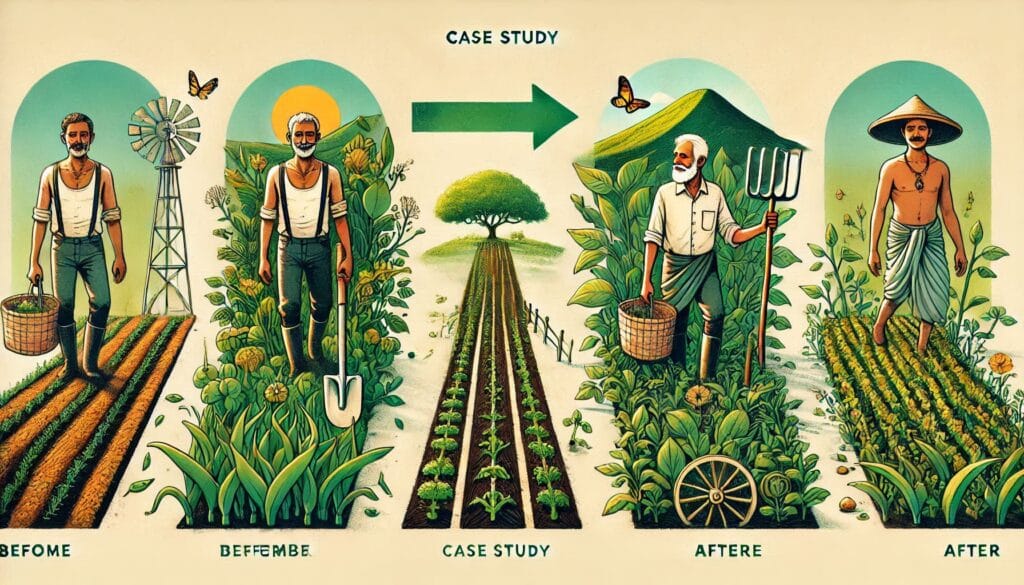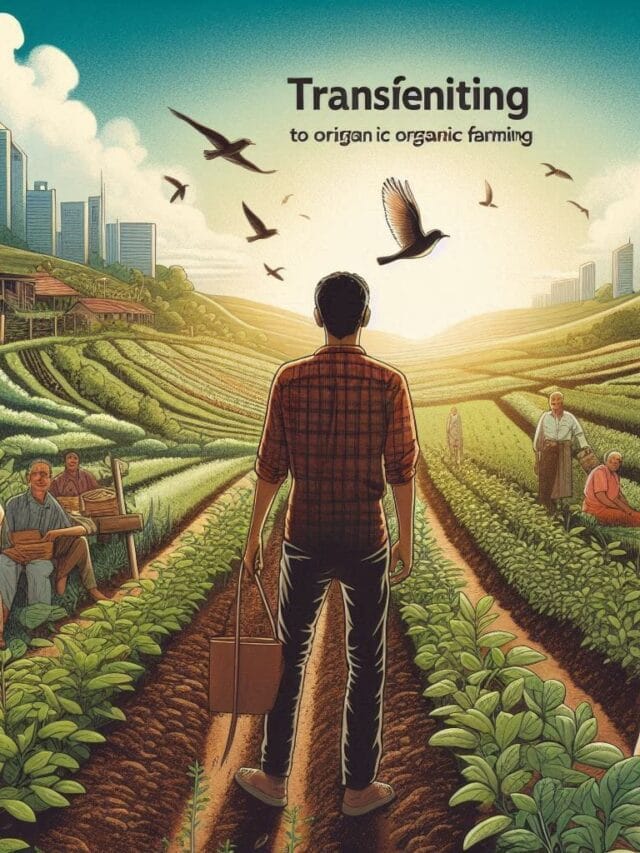Transitioning to organic farming can seem like a daunting task, but for those who take the leap, the rewards can be extraordinary. In this case study, we share the inspiring journey of Rajesh Patel, a small farmer from Maharashtra, India, who transformed his conventional farm into a thriving organic enterprise. His story serves as a beacon of hope and motivation for aspiring organic farmers.

Background
Rajesh Patel inherited a 5-acre farm from his father, where he primarily grew rice and vegetables using conventional methods. Over the years, he noticed declining soil fertility, increasing dependency on chemical inputs, and diminishing profits. Concerned about the long-term sustainability of his farm, Rajesh began exploring organic farming as an alternative.
Initial Challenges
- Knowledge Gap:
- Rajesh had little understanding of organic farming principles.
- He was skeptical about whether organic methods could match the yields of conventional farming.
- Community Resistance:
- Fellow farmers and neighbors questioned his decision, warning him of potential financial losses.
- Market Access:
- Finding buyers for organic produce was a significant concern in his rural area.
The Transition

Step 1: Education and Training
Rajesh began his journey by attending workshops and training sessions on organic farming organized by a local agricultural extension office. He learned about:
- Composting techniques
- Natural pest control methods
- Soil fertility management
- Certification processes
Step 2: Preparing the Land
To detoxify his soil from years of chemical use, Rajesh:
- Stopped using synthetic fertilizers and pesticides.
- Planted cover crops like legumes to enrich the soil with nitrogen.
- Started a composting system to recycle farm waste into organic manure.
Step 3: Implementing Organic Practices
Rajesh gradually introduced organic methods on his farm:
- Crop Rotation: Alternated crops to prevent pest infestations and improve soil health.
- Companion Planting: Paired crops like marigolds with vegetables to deter pests naturally.
- Natural Fertilizers: Used compost, cow dung, and neem cake to nourish the soil.
- Biological Pest Control: Released ladybugs and used neem oil sprays to control pests.
Overcoming Challenges
Financial Struggles
Initially, Rajesh faced reduced yields as his soil adjusted to organic practices. To sustain his farm, he:
- Diversified his income by selling homemade organic fertilizers and vermicompost.
- Applied for government subsidies for organic farming.
Building a Market
Rajesh focused on creating a loyal customer base by:
- Joining Farmers’ Markets: He sold directly to consumers, highlighting the health benefits of his organic produce.
- Using Social Media: Rajesh shared his farming journey on platforms like Facebook and WhatsApp, gaining local followers who became regular buyers.
- Collaborating with Local Stores: Partnered with nearby grocery stores to stock his organic vegetables.
Results and Achievements

Improved Soil Health
After two years, Rajesh observed a significant improvement in soil texture, fertility, and water retention. His farm became more resilient to drought conditions.
Higher Profit Margins
Although his yields were slightly lower than before, the premium prices for organic produce more than compensated for the difference. Rajesh’s profits increased by 40% within three years.
Community Impact
Rajesh’s success inspired neighboring farmers to consider organic methods. He began conducting workshops, sharing his knowledge, and encouraging others to adopt sustainable practices.
Lessons Learned
- Start Small: Rajesh advises starting with a portion of your land to test organic methods before scaling up.
- Patience Pays: Transitioning to organic farming takes time, but the long-term benefits outweigh the initial challenges.
- Build a Network: Connecting with fellow organic farmers and joining cooperative groups can provide valuable support.
- Educate Consumers: Raising awareness about the benefits of organic produce helps build a loyal customer base.

Case Study Recap: Key Takeaways
1. Rajesh Patel’s Journey to Organic Farming Success
- Shifted from conventional farming on a 5-acre plot in Maharashtra.
- Overcame challenges like knowledge gaps, community skepticism, and market access.
- Transformed his farm into a model for organic agriculture.
2. Strategies for a Successful Transition
- Education First: Attended workshops to learn organic methods.
- Land Detox: Stopped chemical inputs and enriched the soil with organic practices.
- Organic Techniques: Crop rotation, natural fertilizers, and biological pest control.
- Innovative Marketing: Leveraged farmers’ markets, social media, and local collaborations.
3. Results That Matter
- Soil Revival: Noticeable improvement in soil health and water retention.
- Economic Boost: 40% higher profits due to premium pricing of organic produce.
- Community Influence: Inspired others to adopt organic farming through workshops and mentoring.
4. Rajesh’s Advice to Aspiring Organic Farmers
- Start Small: Test on a portion of land before full-scale adoption.
- Stay Patient: Initial challenges lead to long-term gains.
- Network: Collaborate with fellow farmers and support groups.
- Educate Consumers: Create awareness about organic benefits to build demand.
Conclusion
Rajesh Patel’s journey from a struggling conventional farmer to a successful organic entrepreneur highlights the potential of sustainable agriculture. His story proves that with determination, education, and community support, small farmers can overcome challenges and achieve remarkable success.





Your article helped me a lot, is there any more related content? Thanks!
Your article helped me a lot, is there any more related content? Thanks! https://accounts.binance.com/en/register?ref=JHQQKNKN
I don’t think the title of your article matches the content lol. Just kidding, mainly because I had some doubts after reading the article.
6eaz9a
Can you be more specific about the content of your article? After reading it, I still have some doubts. Hope you can help me.